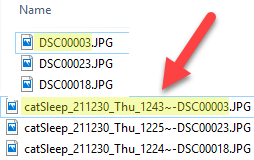Logic
Note: this is explained for a developer.
If that is not you, then look at the examples to see how to call it,
and skip to the
Beginners
section to use it.
Loop through all the files in a folder.
Save each name to an array.
Pre-dimension the array for the maximum number of files.
ReDim Preserve when done for real number read.
Read the date/time modified using the FileDateTime VBA function.
Convert the file date/time to a string using the passed format code
(Default is "yymmdd_ddd_hhnn" if not specified.
Access uses "n" for miNute.)
so it can be included in a filename.
Add the extra information
(specified category and file date/time),
followed by a separator of "~‐"
to the beginning of the file name.
If the separator is already in the filename,
the extra information previously added is removed,
and the adjusted name does not include extra information.
If a format code for date/time of "" is passed,
then any extra information previously added will be removed
and the file name will be put back to its original value.
If a format code is specified,
or the default value is used,
then the new filename will begin with the category,
then a string representing the date/time,
then a separator of "~‐",
and then the original file name.
By default, the date will use a format code of
"yymmdd_ddd_hhnn"
so when files are sorted alphabetically, they will also be chronological.
The text at the beginning of the name is the category:
"p" is for "picture"
and is the default since
it is better to start a filename with a letter than a number.
Note
The specified format code could be checked for
illegal characters in a file name,
but to keep it simpler, this is not done,
so don't send any illegal characters in the format code argument.
There could be an option for extra information
to be before or after the filename,
but to keep it simple and for the order of filenames to be by your code,
it is at the beginning.
You could easily switch the extra information to be at the end
before the file extension.
You could add a parameter for a folder path to copy renamed files to,
and leave original files as they are.
Path wants to be terminated with \.
If you fail to include the trailing backslash,
it will be added.
BACKUP DATA your folder before running this the first time,
just in case results are not what you want.
Hopefully it will work as expected for you,
and you can continue to organize!
Beginners
Are you excited by the possibilities?
Then give this a go --
it is highly useful and can get you started organizing your files.
I've tried to make it easy.
Optional parameters are there for those who want more.
To start, you can just send a path!
How do you get a path?
- Type it in (this is the hard way)
- Copy a path from Windows Explorer or My Computer
then edit to run with that path --
and presto! all files renamed.
It is a good idea to
start with a copy of a folder of files
till you get what you want to do figured out
by running it and looking at the results.
Don't let the apparent complexity of this code scare you off from trying it!
- Create a general module
- , paste the code at the bottom
- , from the menu bar, choose: Debug > Compile Database
- and then Save.
When prompted for a name, use mod_LoopFolder_RenameFiles
or something else logical.
Once it compiles without any issues, you are ready to run.
* if you have problems, email me.
I will try to help and then expand these instructions.
Run
Once you have saved this code in a module,
to run this, without writing any more code:
- Press Ctrl-G to open the Debug/Immediate window
- Paste in one of the examples,
- modify for your path
and, optionally, specify additional parameters if you want to get fancy.
- Then press ENTER to run!
Developers
You may want to modify this code to use results from
ListFiles
instead of looping to get filenames for a path
and maybe also used extended properties to rename with more.
If you have a table or query with a list of path\files,
you can automatically rename many more files.
Parameters
- psPath is the folder path to rename files in
Optional:
- pBooSkipPromptEachFile: True to skip being prompted to change name of each file
- psFormatCode is the format code for the date/time
if "" is passed, the extra information is removed
- psMask is the file pattern to look for (default = "*.*")
- psPrefix is the prefix for the files since names shouldn't start with a number,
and this also gives you a way to group them with a subject.
- psRETURNMsg, String, message to send back to calling program




